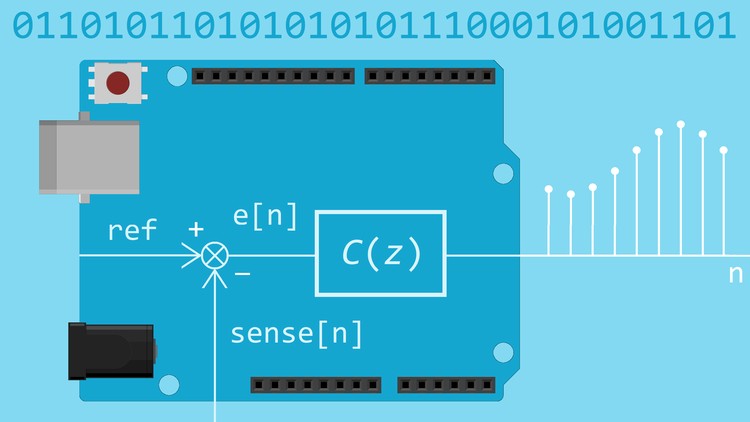
Bridging the Gap Between Discrete-Time Systems Theory, MATLAB, and Real-Time Hardware Implementation!
What you will learn
Students will learn how to implement a digital controller on the Arduino hardware from scratch.
Students will gain an insight to how discrete-time theory, controls, and practical implementation are connected.
Why take this course?
🚀 Digital Feedback Control Tutorial with Arduino 🤖
Course Headline: 🎓 Bridging the Gap Between Discrete-Time Systems Theory, MATLAB, and Real-Time Hardware Implementation!
Unlock the Potential of Your Digital Controllers! 🔓
Learn how to implement real-time digital controllers or compensators on Arduino hardware for feedback control applications! This short tutorial is designed to take the theoretical knowledge of discrete-time systems and controls typically taught in undergraduate and graduate engineering curriculum, and apply them to real-life applications of control systems. 🏫✨
Say goodbye to the typical university project experience that ends with MATLAB simulations and never translates to practical skills. In this course, you’ll work your way from understanding sampled-time systems and Z-transforms all the way to C implementation on Arduino hardware!
📚 Course Description
This engaging tutorial will guide you through the process of designing and implementing real-time digital feedback controllers using the popular Arduino platform. It’s an ideal follow-up to your studies in discrete-time systems, control theory, and signals and systems. 📚🎙️
- Why Digital Control? We’ll kick off with an exploration of the advantages and importance of digital control in various applications.
- Brief Overview of the Z-Transform: Get acquainted with this critical tool for analyzing discrete-time systems.
- Discretization of Continuous-Time Controllers: Learn how to transform your continuous-time controllers into their digital counterparts using Tustin’s Method.
- Implementation of Discrete-Time Systems on Arduino: Bring your theories to life by coding them onto an Arduino microcontroller.
- Digital Controller Design Process (6 Steps): A step-by-step guide to designing a digital controller from scratch.
- Brushed DC Motor Speed Control: Apply what you’ve learned in a practical project, including obtaining the transfer function of a 34:1 12V gearmotor and designing a digital controller for it.
- Real-Time Implementation on the Arduino: Test your design in real-time with an actual hardware setup.
🛠️ Supplemental Material Included
You’ll have access to comprehensive supplemental materials to support your learning journey:
- Laplace and Z-Transform tables for reference
- MATLAB scripts/files to facilitate your design process
- Arduino code/script for the DC gearmotor speed control demonstration project
- Experiment apparatus schematic so you can replicate the setup at home or in the lab
- Useful links to further reading on the derivation and analysis of controllers
✍️ Course Syllabus
- Why Digital Control?
- Brief Overview of the Z-Transform
- Discretization of Continuous-Time Controllers (Tustin’s Method)
- Implementation of Discrete-Time Systems on Arduino
- Digital Controller Design Process (6 Steps)
- Brushed DC Motor Speed Control: Obtaining the Transfer Function
- Brushed DC Motor Speed Control: Digital Controller Design
- Brushed DC Motor Speed Control: Real-Time Implementation on the Arduino
⚠️ Important Note
Before you enroll, it’s crucial to understand that this course is an advanced tutorial designed for students, engineers, hobbyists, and DIYers who already have a solid foundation in discrete-time systems theory, control theory, linear systems and signals, electronics, or Arduino coding. 🕹️👩💻
This is not an introductory course; I will not be covering the foundational theoretical aspects of controller design via root locus, frequency-domain analysis, etc. There will be no assignments or quizzes, making this a flexible learning experience for those looking to complement their existing knowledge and skills. 🎓
👩🏫 Who Is This Course For?
This course is perfect for:
- Students: Who are looking to apply theoretical knowledge practically.
- Engineers: Seeking to enhance their skills in digital control applications.
- Hobbyists and DIYers: Eager to build their own real-time feedback control systems.
Enroll now to take your understanding of digital feedback control to the next level with Arduino! 🚀🎉
Please review the syllabus and course requirements before purchasing, ensuring this course aligns with your current skill set and learning objectives. 📝👀